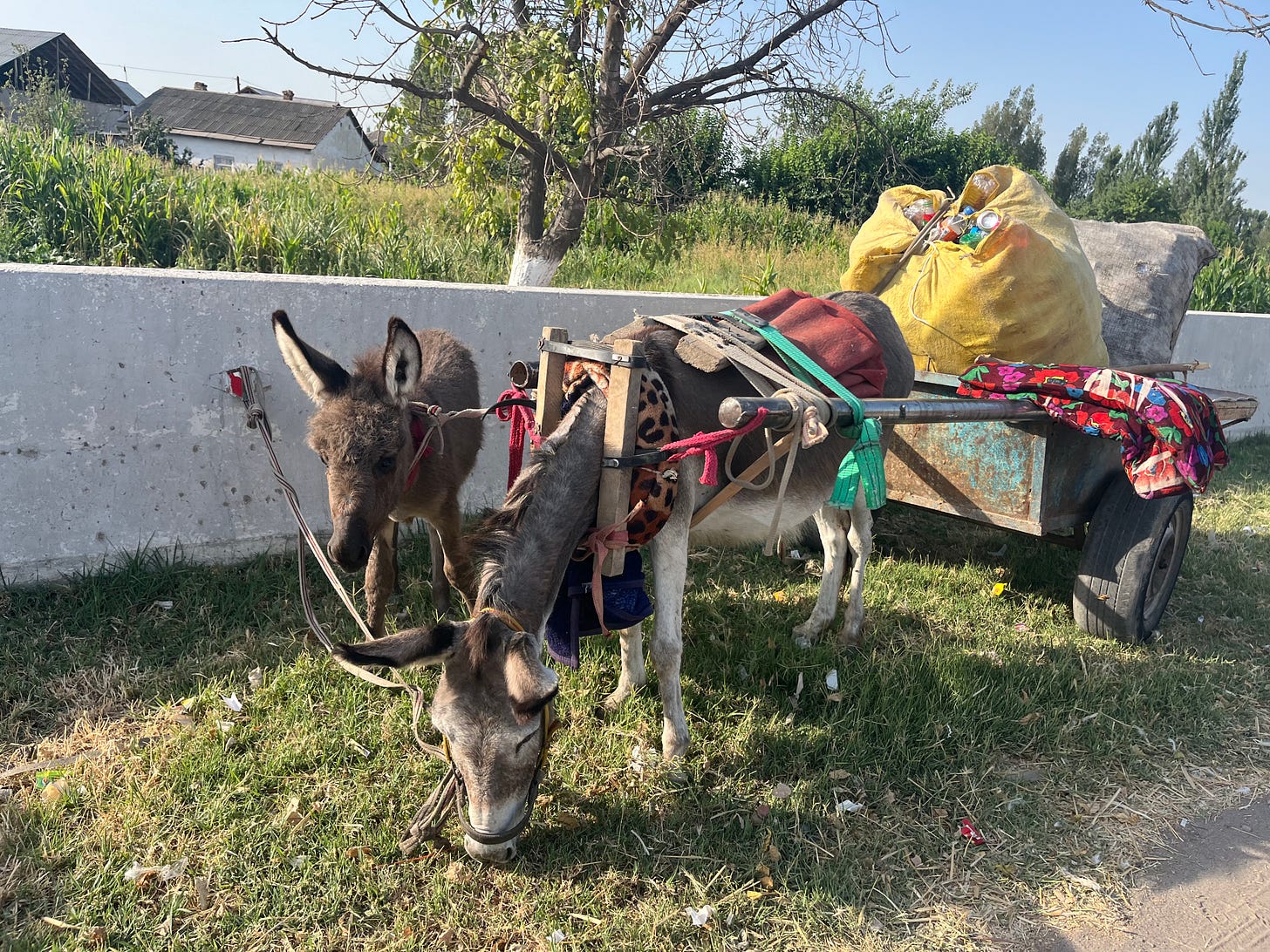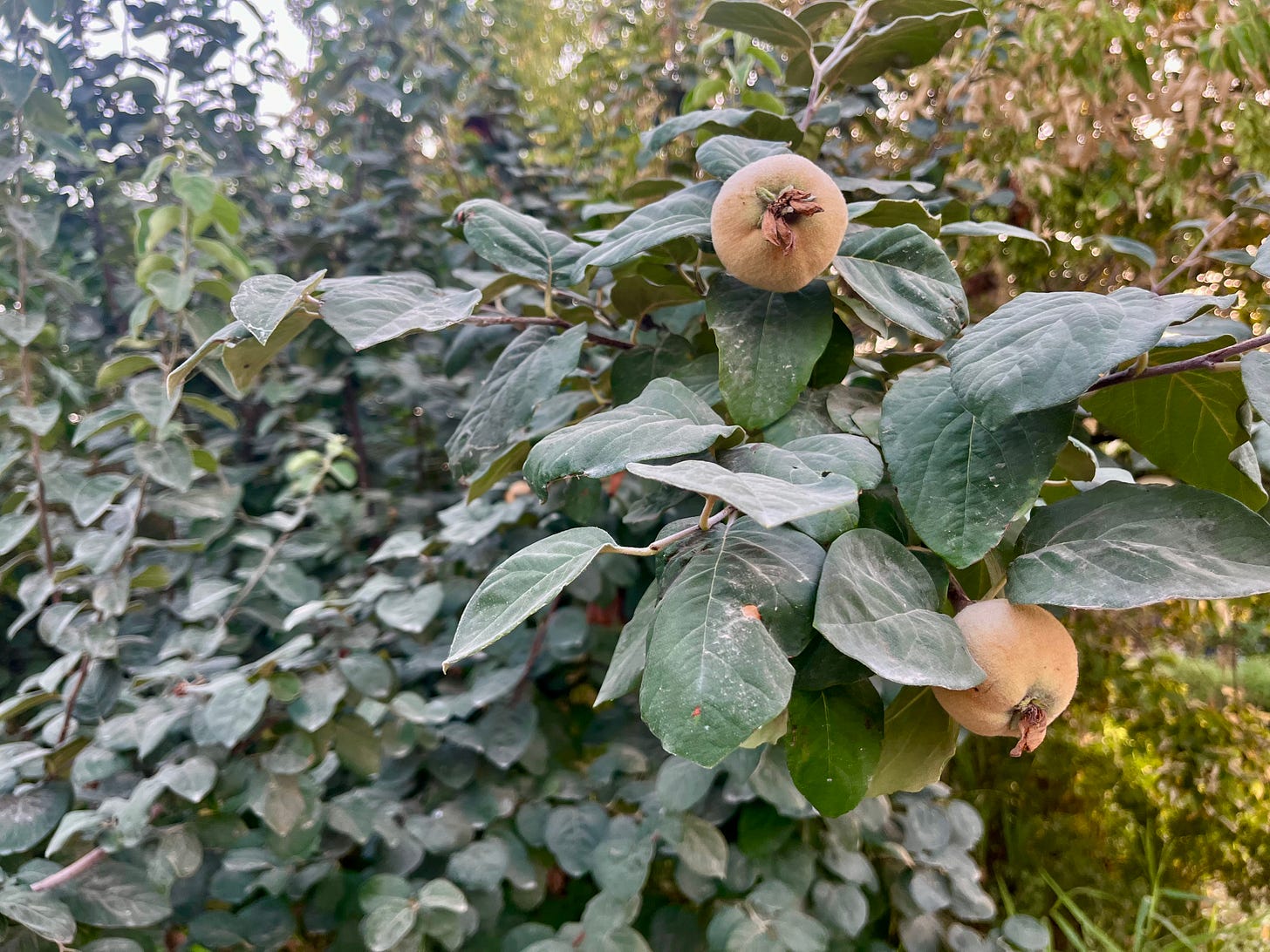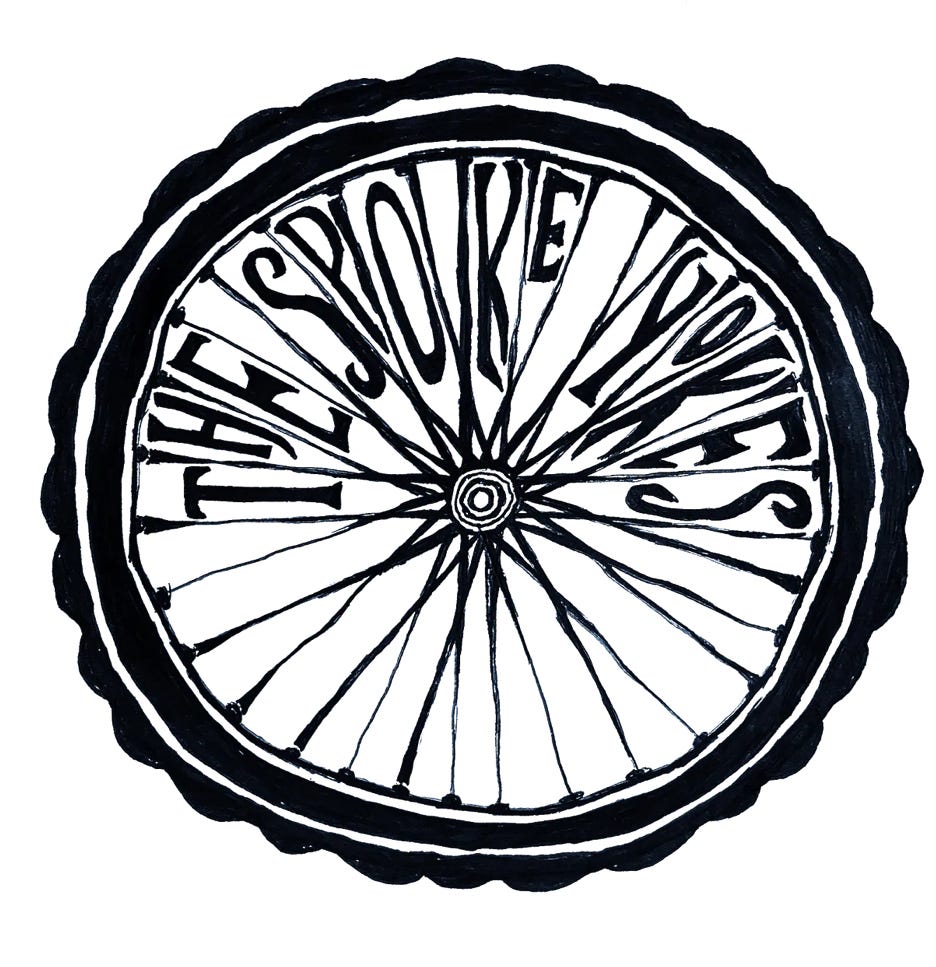The battle of the Som is history
Week 22 - hot-footing it out of Uzbekistan, Spoke Yokes anticipate a whole new ‘stan, but first more Kazakhstan…
“I’m really proud that I didn’t shit myself today,” Mark said as we collapsed into a cheap hotel room with air conditioning on the outskirts of Tashkent, the capital of Uzbekistan.
There was a short pause as I decided whether to congratulate him or not.
“Not all heroes wear capes,” he followed, jokingly.
Cycling with an upset stomach is now, evidently, something we both have experience of.
Border monkeys and border junkies
Monday morning, we reached the end of our time in Uzbekistan, and crossed the border into Eastern Kazakhstan.
Uzbekistan has been the most challenging country of our journey to date, but I just want to reassure readers that, despite the heat and language barrier and exhausting haggling, scarcity of toilets, mosquitoes, overabundance of mutton-based foods, and drivers intent on reversing down hard shoulders at you, it has also been brilliant and interesting and beautiful.
I worry that the last couple of newsletters might have accentuated the challenges, especially when we get comments that the cycling sounds “horrendous” - it’s really not!
We’re still loving our adventure and seeing incredible new sights every day, and very grateful and happy. We are also very proud of how we have adapted to demanding conditions, from -6°С in France in February, to 43°С in the Kyzylkum desert.
We want to be honest about the challenges of this journey, of which there have been many and will be many more: if cycling around the world was easy, everyone would do it, right?!
Mark wrote about the phenomenon of the “border monkey” a few weeks back, noting that a range of enterprises tend to pop up on stretches of road on either side of land borders.
The Uzbek-Kazakh border at Kaplanbek was a staggering, bewildering example of this, with people hawking everything from dodgy SIM cards to fresh-baked non flat-breads to lifts in cars that definitely weren’t taxis, all in a big melee at the approach to the border, and a fair few beggars and bedraggled, dusty children thrown into the mix.
I had read reports of various attempts at scams taking place here, but we were greeted with kindness and the bumbling idiots from ConorMcGregor-land were directed to the right gate by everyone from tiny children to an old lady in a wheelchair.
I’d like to add a new term to Mark’s “border monkeys,” and it’s “border junkies,” because I think that’s what we are becoming. There’s something very special about that last 30km or so before you cycle out of one country and into another. You mentally synopsise and process the highs and lows of where you have been, and begin to prepare yourself for the re-emergence of the strange in a new land.
Leaving Tashkent in the cool early morning, we had about an hour and a half of quiet time with low traffic to approach the border and mentally bid goodbye to all 1,127km that we cycled through the strange, beautiful, dazzling and sometimes harsh country that is Uzbekistan.
Of course, this time we have not entered an entirely unfamiliar place, because we have already been in Western Kazakhstan, and I am very happy to be back in a country that gave us such a warm welcome the first time we encountered it. I find Kazakh manners and mannerisms very gentle and easy-going, and people very quick to laugh. I’m happy to be back.
Which is lucky, because in the coming weeks we will make one further return to Kazakhstan: after a foray into Kyrgyzstan to visit the renowned Lake Issyk Kul, we will cycle to Almaty in Kazakhstan before heading to the Chinese border at Khorgos.
You can do it, put your back into it
Another challenge reared its head this past week with the re-emergence of an old back injury of mine which tends to flare about once every six months and which normally takes about a week of bed rest to get the inflammation under control.
By the time we reached Samarkand, I could feel the beginnings of the twinges, and by Jizzakh, a day’s cycle from Samarkand, it became apparent that I would need to stay horizontal for a time: the cycling was fine, but standing and sitting was agonising and I was very worried about hitting bumps or coming off my bike.
Mark was sanguine about the whole thing, and found us a lovely quiet hotel on the outskirts of Jizzakh - yes, we have joked about the name, but it’s actually one of my favourite Uzbek towns, very beautiful and lined with grape arbors - and haggled a reasonable enough price.
“That’s still a bit high for our budget,” I said with concern, standing in the shade holding my sore back. “Ah yes, but there’s a kettle in the room,” he said with a wink.
Pot noodles in hotel rooms it has been, then, for the past few days as we swung our budget towards comfortable beds in accommodation and away from food. And ibuprofen for me.
After two days in Jizzakh, we cycled just one day, 115km, as far as a town called Oqoltin, and then I needed a further two days rest. It’s been frustrating, but we’ve only managed 380km in the past week. Slow going.
In the hotel in Oqoltin, I was struck by a realisation: cycling around the world can’t change who you are. You have to bring you with you, and that includes frailties and health issues.
While planning this trip, I never envisaged that my back pain would occur. It is usually worse after long periods of inactivity and stressful work, and I naively assumed that the activity of cycling would mean it just wouldn’t happen.
I have not escaped my self by pedalling nearly 8,500km. Back included. That is slightly sobering.
After a first night and more pot noodles in a rather plush hotel in Oqoltin, we stayed a second night and opted to eat some lovely chicken shashliks and a side order of salad in a small roadside restaurant run by lovely people on Saturday evening, in eager anticipation of watching the Cork v Dublin hurling semi-final that night - there is a four hour time difference between Central Asia and Croke Park - and Mark started to feel a little iffy within hours.

However, having luxuriated in bed to watch Cork’s demolition of Dublin, we were up at 4am as usual, and headed to the outskirts of Tashkent, Mark manfully holding things together throughout the 100-odd km ride on increasingly busy roads.
Not all heroes wear capes: some of them wear a legionnaire’s hat, a sock & sandal combo and a slightly pained facial expression.
The valley of shnakes, and a fearsome emperor
Even the beginnings of my sore back weren’t enough to mar the amazing day’s cycling that was last Wednesday, when we left the magnificence of Samarkand at dawn and pedalled 101km to Jizzakh. Because there was something on that route that I had long dreamed of seeing and cycling through.
There have been a few pinch-me moments in this trip so far where I have genuinely not been able to believe that we are doing the thing that we dreamed about and planned for so many years. One came in Romania’s Bicaz Gorge.
Another was at the incredible geographic landmark known as Tamerlane’s Gates on Wednesday: a narrow pass formed by the Zarafshon river which separates the Samarkand region from the steppes beyond.
Three years ago, when planning our route, I first looked at this landmark on Google Maps and found a spot marked as “Tamerlane’s Gate,” which led me into a history rabbit hole reading about the incredible past of this region, an important strategic point on the Silk Road.
“Tamerlane” is the European name for Timur, the mighty 14th century ruler of a vast empire including modern-day Uzbekistan: lame from an injury in his youth, the warrior king was known as “Timur the lame,” leading to a bastardisation of his name as “Tamerlane.”
He was the most powerful Muslim ruler of his time, and he was known both for his fearsome military strategy and brutality, and on the other hand for his cultural and scientific patronage.
His remains are in a mausoleum of great beauty in Samarkand. He is still revered and remembered: we have met little boys called Timur in villages and passed many streets and landmarks that bear his name.
Having invaded and laid waste to vast swathes of the globe, from the Ottoman Empire to Georgia and Armenia to Tehran, Baghdad, and having even approached Moscow, Timur marched with his army through Tamerlane’s Gates in the winter of 1404, intent on war with the Chinese Emperor Chengzu of Ming. He usually embarked on campaigns in springtime and disliked mobilising in winter, seemingly for good reason: just weeks after departing, he died somewhere on the road to modern-day Shymkent in Kazakhstan.
For any travellers through the lands to the west, Tamerlane’s gates would have been a welcome relief, meaning you were just two days from the oasis city of Samarkand. The left hand side of the gorge still bears inscriptions left by Ulugh Beg, Timur’s descendant, to mark a successful military campaign of 1425: Ulugh Beg “embarked on a campaign in the country of Jets and Mongols and from those nations returned safe to these land, in 828 new moon year ,” the inscription reads.
Tamerlane’s gates’ rocky outcrops came into view some 80km after we left Samarkand, as the cool dawn quickly warmed into another scorcher of a morning.
“My ears just popped,” Mark said with surprise as we cycled towards the valley. “That’s just the pressure of the weight of history,” I told him. We stopped for a quick look, and to take in the overwhelming emotion of having cycled to such a place.
Later, I read that the gorge has an alternative name: Snake Gorge, because of the vast number of slithery reptiles that make the area their home. “Shnake valley!” Mark said. “And we didn’t see one!”
If I’ve been lugging an old back injury around this past 8,400km, Mark is carrying his own baggage: his Irish accent gets stronger the further we get from home. By Cambodia I think I will have difficulty understanding him.
Long live cold drinks
A commenter on one of Mark’s social media posts on cycling in the desert advised him against drinking cold drinks, saying that body temperature water hydrates you better.
We have certainly been slugging our fair share of blood-warm water on the bike, because after about 7am, nothing stays cool. Sometimes the water in my water bottle is approaching a tea-like temperature by noon.
Whether or not there is a measurable improvement in hydration when water is not cold, I can say for sure that the morale boost of the promise of a beaded, frosty glass or bottle of something cold has an impact: both Mark and I speed up noticeably when we are within an hour of a stop with guaranteed cold drinks.
In the Kyzylkum desert, we once overtook a much younger and fitter cyclist who followed us with surprise into our roadside restaurant destination. “We don’t always cycle like that, only when we know there’s a café break!” I reassured him.
The only real downside of this is that cold drinks almost invariably mean sugary ones: the ubiquity of big-brand soft drinks at even the smallest roadside stall, often no more than a generator and a fridge, makes the temptation very real and the correlation between the sensation of having your thirst quenched and getting a sugar hit drills deep into the brain.
You’d worry for diabetes rates and other health problems for Uzbek people as a result, and it’s sad to see the bottles and cans taking over from watermelons (filtered water, sugars and nutrients, all in its own biodegradable packaging?) as the refreshment of choice.
We’ve stopped at melon stalls a couple of times, but it’s hard to carry a 6kg watermelon on a bike! We’ve stuck to smaller cantaloupe style ones, and they are very delicious.
Trees please
Samarkand’s apricots have all dropped in the fierce heat of midday. In Jizzakh, tiny raisin-like things on trees puzzle us, until we realise they are cherries which have dried on the stem.
I hear there’s a heat wave in Europe.
There seems to be a lot of frightening talk of a “heat dome,” which sounds breathless and inescapable.
Extreme heat is nothing new in Uzbekistan: a high of 49°С was first recorded in the city of Termez in 1914, and again in the Kyzylkum desert in 1983. So maybe European countries can start looking to take decisive adaptive actions, if they believe that temperatures in the forties are going to become the norm?
The first thing to do is probably to plant a load of trees.
Mark and I have an ongoing game where we choose which customs or items of each country we visit we would like to bring back to Ireland with us and integrate into our lives and community at home.
I’m bringing home French aperitifs, German haus schuhe, Turkish teapots and Georgian lemonade, for starters. I’m going to add the Uzbek respect for trees to this list.
It’s been one of my favourite things about Uzbekistan, to see how much trees are valued and cared for, how their shade is treasured and utilised. A government-backed planting programme is underway at present and saplings of suitable species are being planted alongside many of the roads we cycled. Every tree is whitewashed about a third of the way up its trunk: this protects them from splitting as they undergo an annual temperature range that drops as low as -8°С in winter.
We have appreciated no end the roads where we have been flitting in and out of cooling patches of shade, as opposed to the long, dusty, exposed stretches with no shelter from the pounding heat of the sun.
Entering oasis cities like Bukhara and Samarkand along great cool tree-lined avenues of fruit trees is one of the highlights of Uzbekistan for me. Trees good, fruit trees, which convert some of that fierce sun into sugars, even better.
Apricot season is over in Uzbekistan, but the plums and apples are in, and quinces, walnuts and grapes are to follow.
The battle of the Som
The thing I really won’t miss about Uzbekistan is what Mark started referring to as “the battle of the som,” som being the name of Uzbek currency. Having to haggle, and being relentlessly and mercilessly overcharged because you’re a foreigner is not a pleasant experience.
I know the philosophical approach is to grin and bear it as a byproduct of coming from a genuinely affluent place. But I can’t help but feel that it’s a very real form of discrimination that is sanctioned by the Uzbek government and that it would make life very tough for those “foreigners” and displaced people who have to make the country their home.
There are two price lists on display in every hotel, one for “citizens” and one for “foreigners.” This system validates discrimination: because shops don’t display prices, staff will pull wildly high prices out of thin air in front of you, and the onus is on you to argue the point. One very hot day in Samarkand, I grabbed a 1 litre bottle of water at a stall and the man tried to charge me 10,000 som for it. I already knew that this was extortionate, and when I acted indignantly, he smiled, shrugged and immediately halved the price.
At a roadside apple stand, an older woman tried to give us a gift of four tiny apples, even as her granddaughter tried to demand an inexplicable 19,000 som for them: when we asked her how four apples could cost that indivisible price, she just laughed.
We have been in several countries where haggling is the norm, but in Uzbekistan it has sometimes been accompanied by rudeness and hostility, which hasn’t been all that nice. But for all of those encounters, there have of course been an equal number of smiles and kind greetings.
But I’m not sorry the battle of the som is history.
Headed for the hills
Some of our road ahead through Kazakhstan before we reach Bishkek, the Kyrgyz capital, is hot and dusty.
But we’re headed for the hills, and will be rewarded for any climbing we do with a corresponding decrease in temperature. In Kyrgyzstan, I read that current temperatures at lake Issy Kul are in the high twenties.
We can’t wait for a dip.
Hold her steady, keep it between the ditches and don’t forget the factor 50!











So THAT'S why they paint the tree trunks white! Saw that in Morocco and didn't know why. They also build clever channels to capture and contain water that they use to irrigate crops with. As you say, we've something to learn. I reckon those snakes were just hiding when they heard the Irish accents! Hope your back is better now x
Am sitting in Browns bar here in Tbilisi,reading your emails off your great journals whish are very interesting, am not sure if you both remember me but am the old Irish guy from Kildare, anyway am heading of to Turkmenistan early next month, got my visa by sure luck…. I just wanted to wish you both the best of Irish luck on your magnificent journey and for what’s its worth I will be remembering you in my prayers (I know its a bit cheesy buts it’s our culture) Am looking forward to your next posting, God bless.